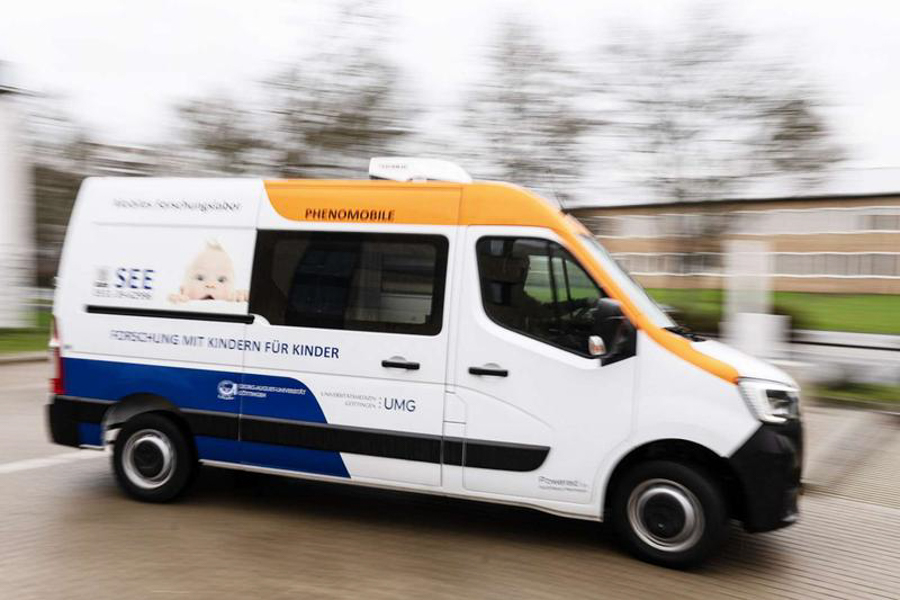The PHENOMOBILE – Research with children for children
Innovative and unique worldwide: researchers from UMG and the University of Göttingen are developing a mobile examination laboratory for decoding early childhood development.

The PHENOMOBILE - the rolling research laboratory for children with children. Photo: umg/spförtner
Bernstein members involved: Florentin Wörgötter
How much do we know about early childhood? Capturing social skills, first vocalizations and movements of babies and analyzing the beginning of communication between child and mother is a sensitive undertaking. Not only is this scientifically important, but it may soon help to identify developmental disorders in time to offer early support. To achieve this, Göttingen scientists want to “get close” to mothers and their children – with the help of a novel “laboratory on wheels”, the “Phenomobile”. In doing so, they have developed a completely new and globally unique concept in developmental and interaction research.
The fully equipped rolling laboratory is an exact replica of the developmental laboratory in the Clinic of Child and Adolescent Psychiatry at UMG, so that the same investigations are possible in the Phenomobile. In addition to six cameras from different angles, recording equipment, and powerful computers, there is a dedicated air conditioning and heating system on board so that the lab can work year-round regardless of external conditions.
The rolling laboratory was designed by Prof. Dr. Dr. Peter Marschik, Department of Child and Adolescent Psychiatry and Psychotherapy at the University Medical Center Göttingen (UMG). Together with Prof. Dr. Luise Poustka (UMG) and Prof. Dr. Florentin Wörgötter (University of Göttingen), he and his team are studying the development of healthy newborns and babies at increased risk for developmental disorders. “We know that it can be very time-consuming for parents with several young children to attend regular examination appointments, even if they would like to participate in a study. So if parents can’t come to our clinic, the lab drives right up to their front door,” says Prof. Luise Poustka, director of the Department of Child and Adolescent Psychiatry and Psychotherapy (KJP) at UMG. The goal of the long-term study is to gain a more precise understanding of typical early childhood development. “This will subsequently enable us to identify developmental disorders such as autism earlier and provide targeted support for children and their families,” says Prof. Marschik.
With the support of local companies, it has been possible to develop a customized prototype of the mobile lab for mobile use. The Phenomobile is part of a research network involving scientists from the University Medical Center and the University of Göttingen, the Bernstein Center for Computational Neuroscience, the Leibniz ScienceCampus “Primate Cognition” and the Collaborative Research Center “Cognition of Interaction” (SFB 1528). “While there are similar mobile concepts, e.g. in patient‘s care. However, the rolling laboratory for the examination of young children is a unique innovation,” says Luise Poustka. Peter Marschik says, “Only by examining babies at very close intervals from birth can we better understand very early development and identify developmental abnormalities. The Phenomobile is an important contribution, also because we can reach many more families from now on.”
“With the help of artificial intelligence, we can bring new methodological approaches to developmental science in the Phenomobile,” says Prof. Florentin Wörgötter from the III Institute of Physics at the University of Göttingen, who supervised the technical development of the Phenomobile. “Thus, this project and the collaboration of the participating institutions is exemplary for the lived interdisciplinary cooperation at the Göttingen Campus.” The ‘rolling laboratory’ is being used in several research projects in Göttingen and the region and benefits from long-standing support from the German Research Foundation (DFG), the Volkswagen Foundation, the Leibniz Association and the German Federal Ministry of Education and Research (BMBF). “The concept is a model for the future that can also serve as an example for other projects,” say the researchers involved.
Translated from German by Alexander Lammers/Bernstein Network Computational Neuroscience.




